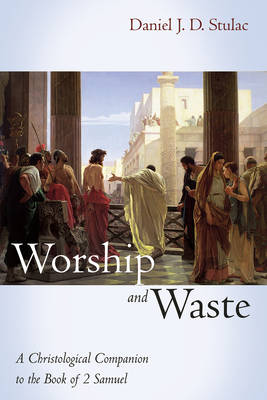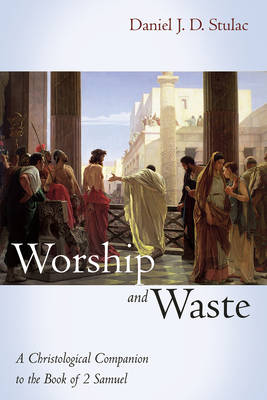
- Afhalen na 1 uur in een winkel met voorraad
- Gratis thuislevering in België vanaf € 30
- Ruim aanbod met 7 miljoen producten
- Afhalen na 1 uur in een winkel met voorraad
- Gratis thuislevering in België vanaf € 30
- Ruim aanbod met 7 miljoen producten
Zoeken
Worship and Waste
A Christological Companion to the Book of 2 Samuel
Daniel J D Stulac
Hardcover | Engels
€ 49,95
+ 99 punten
Uitvoering
Omschrijving
Worship and Waste is the third installment in Stulac's Christological Companion series, which focuses on the books of Judges (Gift of the Grotesque), 1 Samuel (Tragedy of the Commons), and now 2 Samuel. As the first two volumes demonstrate, Stulac's refreshing approach to biblical interpretation combines hard-won exegetical insights with poignant memoir and incisive reflections on culture, art, and Christian spirituality. Picking up the biblical storyline where Tragedy left off, Worship and Waste invites readers to sink deeply into the Bible's paradoxical portrait of King David--a rapist-murderer caught between God's unconditional love and his own brutality. Carefully avoiding moralisms, Stulac guides his readers through 2 Samuel's graphic depictions of sin by insisting that the text continually looks forward to Jesus Christ, the ultimate Davidic King. "David's Punishment thoroughly penetrates God's Promise," observes Stulac, "but at the same time, God's Promise still governs the execution of his Punishment. The two 'forevers' of 2 Samuel are forever mixed." Will David's tragedy transform into comedy before the final curtain falls? Will hope survive? "Can a ruined House," asks Stulac, "find within its suffering the durable Promises of God?"
Specificaties
Betrokkenen
- Auteur(s):
- Uitgeverij:
Inhoud
- Aantal bladzijden:
- 136
- Taal:
- Engels
Eigenschappen
- Productcode (EAN):
- 9798385219025
- Verschijningsdatum:
- 14/08/2025
- Uitvoering:
- Hardcover
- Formaat:
- Genaaid
- Afmetingen:
- 152 mm x 229 mm
- Gewicht:
- 358 g

Alleen bij Standaard Boekhandel
+ 99 punten op je klantenkaart van Standaard Boekhandel
Beoordelingen
We publiceren alleen reviews die voldoen aan de voorwaarden voor reviews. Bekijk onze voorwaarden voor reviews.







